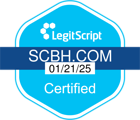What Type of Drug Is Heroin?
Heroin is a type of opioid which is a class of drugs used for pain relief. Examples of prescription opioids for pain management include oxycodone (OxyContin), hydrocodone (Vicodin), codeine, morphine, and many others. Heroin is not available by prescription. It is an illegal street drug with no valid medical use. People who use heroin do so to get high.
Heroin comes in different forms and has many different nicknames. The main ways heroin is consumed is via snorting, smoking, or injection. The drug binds to opioid receptors in the brain, producing intense feelings of euphoria. Because it is an opioid, heroin can also bring substantial pain relief and drowsiness.
Using heroin is incredibly dangerous due to its high addiction and overdose potential. People often inject heroin, which is also dangerous due to disease. In this article, we’ll explore how addictive heroin is, heroin overdose symptoms to watch out for, and heroin addiction treatment at a drug and alcohol addiction treatment center.
Is Heroin Addictive?
Heroin is extremely addictive. It affects the brain’s reward system by increasing the release of dopamine, a neurotransmitter associated with pleasure and reward. This leads to the reinforcing effects of heroin use and contributes to heroin addiction.
Regularly using heroin can lead to tolerance and dependence, which in turn leads to withdrawal symptoms when trying to cease use. This fear of heroin withdrawal symptoms is what leads to addiction. In that case, someone may need treatment for heroin addiction.
Heroin withdrawal symptoms include:
- Muscle aches and pain
- Restlessness and agitation — Individuals may feel restless, irritable, or anxious as their body adjusts to the absence of heroin
- Yawning — Frequent yawning is a common symptom of heroin withdrawal
- Dilated pupils — Pupils may become enlarged during withdrawal
- Sweating, cold chills, and goosebumps
- Nausea, vomiting, and diarrhea
- Runny nose and teary eyes
- Insomnia
- Anxiety
- Depression
Treatment for heroin addiction often involves a combination of medication-assisted therapy, behavioral therapy, and support from healthcare providers and recovery communities.
If you or a loved one are suffering from heroin addiction, seek professional treatment for drug abuse as soon as possible.
Get confidential help from our addiction treatment specialists in Orange County. Call to join our rehab program today!
Call 866-881-1184Signs Someone Is Using Heroin
If you suspect someone is using heroin, look for the following physical signs:
- Constricted or “pinpoint” pupils
- Sudden and unexplained weight loss
- Flushed or itchy skin
- Needle marks or “track marks” on arms, legs, or other areas of the body
- Nosebleeds or constant sniffling (if heroin is snorted)
- Slurred speech and disorientation
- Drowsiness or frequent “nodding off”
- Constipation and gastrointestinal issues
- Drug paraphernalia around the house – glass pipes, used syringes, rubber tubing, etc
There are also behavioral signs of heroin use, such as the following:
- Failing to fulfill responsibilities at home, such as chores, due to heroin use
- Neglecting personal hygiene
- Sliding academic performance; poor test results and skipping school
- Sudden, inexplicable need for money
- Secretive behaviors
- Legal issues
- Sudden changes in friends, favorite hangouts, and hobbies
- Wearing long sleeves and pants during warm weather to hide “track marks”
What Are Heroin Overdose Symptoms?
Some common symptoms of a heroin overdose may include:
- Slow, shallow, or irregular breathing
- Pinpoint pupils
- Bluish lips and nails
- Drowsiness or unconsciousness
- Limp body
- Clammy skin
- Gurgling sounds, which indicate fluid in their lungs or airway obstruction
- Wearing long sleeves and pants during warm weather to hide “track marks”
- Vomiting
- Seizures
If you suspect someone is experiencing a heroin overdose, call emergency services immediately. Time is crucial when there is a heroin overdose, and rapid intervention can save lives.
There are medications, such as naloxone, that can help reverse the effects of an opioid overdose if administered in time.
Remember, never attempt to treat an overdose yourself — always seek professional medical help. Effective treatment always starts with someone experienced in substance use disorders. Substance abuse and addiction can ruin someone’s life very quickly. Heroin use disorder is one of the most dangerous. Treatment programs from South Coast can help in harm reduction and detox from heroin.
Finding Reliable Heroin Addiction Treatment in California
Heroin addiction is serious, but you can recover and lead an independent life with proper heroin treatment. South Coast Behavioral Health is committed to helping you or your loved ones overcome heroin addiction.
This begins with enrolling in our medical detox program. We offer medical detox in Irvine, California for men and medical detox in Huntington Beach for women. There, certified professionals can help you through heroin withdrawal as you detox.
After detoxing, proper treatment for heroin addiction can begin. Our team of experts will prescribe medication to manage ongoing cravings while also providing therapy to address issues underlying the heroin addiction. This combined approach is known as medication-assisted treatment.
This approach to treating heroin addiction can take place along several levels of care:
- Residential inpatient treatment in Costa Mesa, Irvine, and Huntington Beach
- Partial hospitalization in Newport Beach
- Intensive outpatient treatment in Newport Beach
We can also help with sober living homes, finding an outpatient program, facilitating family therapy, dual diagnosis treatment, individual therapy, relapse prevention, learning new coping skills, and more. We offer evidence-based treatments like cognitive-behavioral therapy and dialectical behavior therapy.
Recovery from heroin use or opioid use disorders is a long road but it begins with accepting treatment. If you have any questions about addiction recovery, please call us at 866-881-1184. Our addiction specialists are available 24/7 to take your call.











